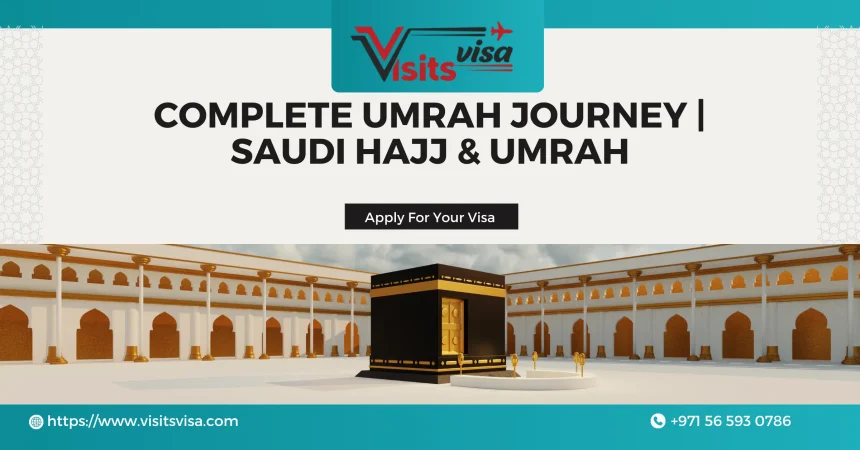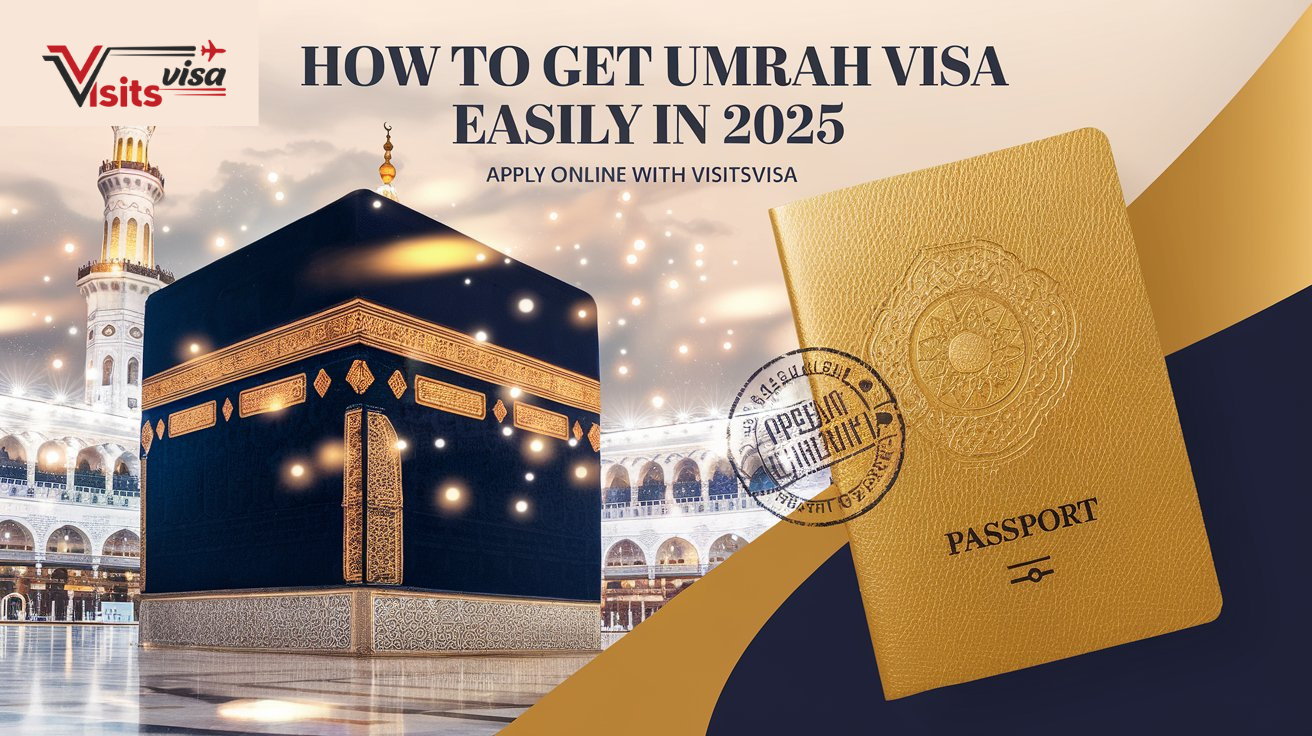Introduction
Undertaking the journey of Umrah is a deeply spiritual experience for Muslims across the globe. Unlike Hajj, which has specific dates according to the Islamic lunar calendar, Umrah can be performed at any time of the year, making it more accessible to the global Muslim community. This comprehensive guide aims to cover every aspect of the Umrah journey, with a special focus on the services offered by Visitsvisa, a renowned provider of Umrah visa. By understanding each step of the process, from visa application to the rituals performed during Umrah, pilgrims can ensure a meaningful and well-organized pilgrimage.
What is Umrah?
Definition and Significance
Umrah is a voluntary pilgrimage to Mecca, the holiest city for Muslims, located in Saudi Arabia. It is often referred to as the ‘lesser pilgrimage’ compared to Hajj, which is obligatory for all Muslims who are physically and financially able at least once in their lifetime. Despite being voluntary, Umrah holds immense spiritual significance. It is a means of seeking forgiveness, making supplications, and cleansing the soul. Performing Umrah is believed to erase sins and bring the pilgrim closer to Allah.
Historical Background
The tradition of Umrah dates back to the time of the Prophet Muhammad (PBUH). The rituals performed during Umrah commemorate the actions of the Prophet Ibrahim (Abraham) and his family. The historical context of Umrah enhances its spiritual significance, connecting modern-day pilgrims with the profound history of their faith. Understanding this historical backdrop can deepen the pilgrim’s appreciation and mindfulness during the journey.
Comparison with Hajj
While both Umrah and Hajj are pilgrimages to Mecca, they differ in several ways. Hajj is one of the Five Pillars of Islam and must be performed during the Islamic month of Dhu al-Hijjah. In contrast, Umrah can be performed at any time of the year. The rituals of Umrah are also shorter and less physically demanding than those of Hajj. However, both pilgrimages share common elements such as Tawaf (circling the Kaaba) and Sa’i (walking between Safa and Marwah), highlighting their interconnectedness in Islamic practice.
Preparing for Umrah
Spiritual Preparation
The journey of Umrah begins with spiritual preparation. Pilgrims should engage in sincere repentance, seeking forgiveness for past sins and making heartfelt supplications. It is also recommended to study the rituals and significance of Umrah to perform them with mindfulness and devotion. Spiritual readiness involves purifying the heart, strengthening faith, and cultivating a state of humility and gratitude.
Physical Preparation
Physical readiness is crucial for the demanding rituals of Umrah
. Pilgrims should ensure they are in good health and physically fit. This might include regular exercise, maintaining a healthy diet, and ensuring vaccinations and medical check-ups are up to date. Packing appropriate clothing, personal hygiene items, and other essentials is also part of the preparation. A well-prepared pilgrim can perform the rituals more comfortably and with greater focus.
Financial Planning
Undertaking Umrah requires careful financial planning. While it is generally less expensive than Hajj, costs can still be significant. Pilgrims need to budget for travel, accommodation, meals, and other expenses. Saving in advance and planning the budget can help in managing costs effectively. It is also wise to keep some extra funds for unexpected expenses. Financial preparedness ensures that the pilgrimage can be performed without undue stress or financial strain.
Applying for Umrah Visa
Importance of Umrah Visa
An Umrah visa is a mandatory document required for entry into Saudi Arabia for the purpose of performing Umrah. This visa is specifically issued for pilgrimage and has certain conditions and validity periods. Understanding the importance of this visa and the application process is crucial for a smooth journey. Without a valid Umrah visa, entry into Saudi Arabia will be denied.
How to Apply Online
Visitsvisa provides a convenient online application process for obtaining an Umrah visa. This section offers a step-by-step guide on how to apply for an Umrah visa online. The process typically involves filling out an application form, submitting required documents, and paying the visa fee. Online application through Visitsvisa simplifies the process, making it accessible and hassle-free for pilgrims from different parts of the world.
Documents Required
Applying for an Umrah visa requires specific documents. These usually include a valid passport, recent passport-sized photographs, confirmed travel and accommodation bookings, and proof of vaccination. A comprehensive list of necessary documents is essential to avoid delays or rejections in the application process. Preparing these documents in advance ensures a smooth and efficient application process.
Processing Time
Understanding the typical processing times for an Umrah visa can aid in better planning of the pilgrimage. Processing times may vary depending on the season and the volume of applications. Generally, it takes a few days to a couple of weeks for the visa to be processed. It is advisable to apply well in advance to avoid last-minute issues. Keeping track of the application status and maintaining open communication with the visa provider can help in timely processing.
Travel Arrangements
Booking Flights
Booking flights to Saudi Arabia is a significant part of planning the Umrah journey. Pilgrims should consider various airlines, flight routes, and timings to find the most suitable options. This section provides guidance on choosing the best airlines, finding affordable tickets, and managing flight bookings. Early booking can often result in better deals and more convenient flight schedules.
Accommodation Options
Accommodation in Mecca and Medina ranges from luxury hotels to budget-friendly options. Pilgrims should choose accommodation based on their budget, preferences, and proximity to the holy sites. This section offers detailed information on various accommodation options, including tips for finding comfortable and affordable places to stay. Booking in advance can help secure the best rates and preferred locations.
Transportation in Saudi Arabia
Navigating transportation within Saudi Arabia is an important aspect of the Umrah journey. Pilgrims can choose from various options such as buses, taxis, and car rentals. This section provides an overview of transportation options, tips for safe and efficient travel, and advice on choosing the best mode of transport. Understanding the local transportation system can make the journey more convenient and stress-free.
Essential Rituals of Umrah
Ihram: The Sacred State
Entering the state of Ihram is the first ritual of Umrah. Pilgrims must wear specific garments and abstain from certain activities to maintain the purity of this state. This section explains the significance of Ihram, how to properly wear the garments, and the do’s and don’ts while in Ihram. Understanding and respecting the rules of Ihram is crucial for a spiritually fulfilling Umrah.
Tawaf: Circling the Kaaba
Tawaf involves circling the Kaaba seven times in a counter-clockwise direction. This act symbolizes the unity of believers in the worship of the One God. This section provides a detailed guide on performing Tawaf, including its significance, the required supplications, and practical tips for a smooth experience. Tawaf is one of the most profound rituals of Umrah, and performing it with devotion enhances its spiritual impact.
Sa’i: Walking between Safa and Marwah
Sa’i is the ritual of walking seven times between the hills of Safa and Marwah, commemorating Hagar’s search for water for her son Ismail. This section describes the significance of Sa’i, the historical context, and a step-by-step guide on performing this ritual. Understanding the story behind Sa’i can deepen the pilgrim’s connection to the ritual and its spiritual significance.
Halq or Taqsir: Shaving or Trimming Hair
The final ritual of Umrah is Halq (shaving the head) or Taqsir (trimming the hair). This act signifies the end of the pilgrimage and a new beginning for the pilgrim. This section provides guidelines on how to perform Halq or Taqsir, including the significance of this act and practical tips. Completing this ritual marks the completion of Umrah and the spiritual renewal of the pilgrim.
Places to Visit in Mecca
The Kaaba
The Kaaba is the most sacred site in Islam, located in the center of the Masjid al-Haram in Mecca. This section explores the significance of the Kaaba, its history, and tips for visiting and praying at this holy site. Understanding the importance of the Kaaba enhances the spiritual experience of Umrah.
Masjid al-Haram
Masjid al-Haram is the largest mosque in the world, surrounding the Kaaba. This section provides an overview of Masjid al-Haram, its significance in Islam, and practical information for pilgrims. Visiting Masjid al-Haram is a central part of the Umrah experience, and understanding its layout and facilities can help pilgrims navigate it more easily.
Mount Arafat
Mount Arafat is a significant site in Islamic history, known for the Prophet Muhammad’s (PBUH) Farewell Sermon. Although primarily associated with Hajj, visiting Mount Arafat can be a spiritually enriching experience for Umrah pilgrims as well. This section provides information on the significance of Mount Arafat and tips for visiting this sacred site.
Places to Visit in Medina
Al-Masjid an-Nabawi
Al-Masjid an-Nabawi, the Prophet’s Mosque, is the second holiest site in Islam, located in Medina. This section explores the significance of Al-Masjid an-Nabawi, its history, and practical tips for visiting and praying at this mosque. The mosque is also the burial place of Prophet Muhammad (PBUH), making it a deeply revered site for Muslims.
Jannat al-Baqi
Jannat al-Baqi is a cemetery in Medina where many of Prophet Muhammad’s (PBUH) family members and companions are buried. This section provides an overview of Jannat al-Baqi, its historical significance, and tips for visiting this sacred site. Visiting Jannat al-Baqi can be a spiritually moving experience for pilgrims.
Quba Mosque
Quba Mosque is the first mosque built by Prophet Muhammad (PBUH) in Medina. This section explores the historical and spiritual significance of Quba Mosque, including practical tips for visiting and praying at this mosque. Understanding the history of Quba Mosque can enhance the pilgrim’s appreciation of this sacred site.
Practical Tips for Pilgrims
Health and Safety
Ensuring health and safety during the Umrah journey is paramount. This section provides essential health and safety tips, including information on required vaccinations, travel insurance, and staying safe during the pilgrimage. Taking these precautions can help pilgrims have a safe and healthy journey.
Cultural Sensitivity
Respecting local customs and traditions in Saudi Arabia is crucial for a respectful and harmonious experience. This section offers guidelines on cultural sensitivity, including dress codes, social etiquette, and religious practices. Being aware of and adhering to local customs can enhance the pilgrim’s experience and foster mutual respect.
Communication Tips
Staying connected with family and friends during the Umrah journey is important for many pilgrims. This section provides tips on communication, including information on local SIM cards, internet access, and using mobile devices. Staying connected can provide peace of mind and support during the pilgrimage.
Post-Umrah Activities
Reflecting on the Experience
Reflecting on the Umrah experience is an essential part of the pilgrimage. This section encourages pilgrims to take time to reflect on their journey, including journaling and sharing their experiences with others. Reflecting on the spiritual insights gained during Umrah can deepen the pilgrim’s connection with Allah.
Continuing Spiritual Growth
Continuing spiritual growth after Umrah is important for maintaining the connection with Allah. This section provides tips on how to sustain and nurture spiritual growth, including regular prayer, reading the Quran, and engaging in community service. Ongoing spiritual development can help pilgrims integrate the lessons of Umrah into their daily lives.
Sharing the Experience
Sharing the Umrah experience with family and friends can be a meaningful way to extend the blessings of the pilgrimage. This section offers ideas for sharing the journey, such as hosting a gathering, giving a presentation, or sharing photos and stories. Sharing the experience can inspire others and create a sense of community and support.
Conclusion
The journey of Umrah is a profound and transformative experience for Muslims around the world. By understanding the significance of Umrah, preparing adequately, and performing the rituals with devotion, pilgrims can achieve a spiritually fulfilling pilgrimage. Visitsvisa offers comprehensive services to facilitate the Umrah journey, making it accessible and manageable for pilgrims. Embarking on this spiritual journey can bring immense blessings and spiritual growth, drawing the pilgrim closer to Allah.







